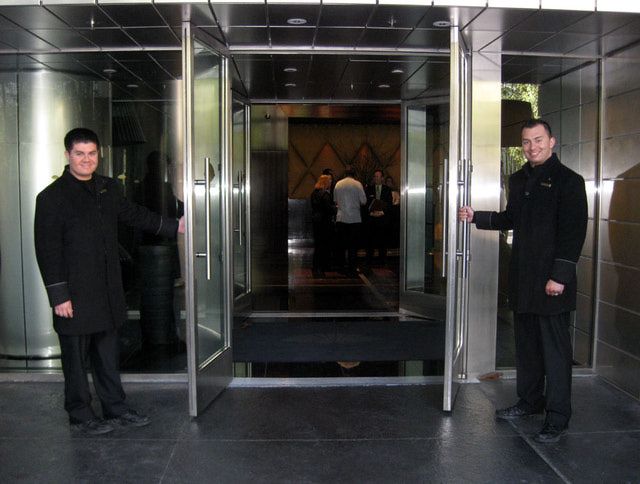Understanding Door Supervision Service Agreements
A door supervision service agreement outlines the terms and conditions governing the provision of security services by sub-contractors, typically to licensed premises such as bars, clubs, and events. These agreements establish the rights, responsibilities, and liabilities of both the sub-contractor and the principal security company.
Legal Framework and Regulatory Compliance
Door supervision service agreements must adhere to relevant legislation, including the Private Security Industry Act 2001 and the Security Industry Authority (SIA) regulations. Compliance with these laws is essential to ensure that all security personnel are properly licensed and meet the necessary qualifications and training requirements.

Key Components of the Agreement
Scope of Services
Clearly define the scope of the security services to be provided by the sub-contractor, including the location, hours of operation, and specific duties required.
Insurance Requirements
Specify the insurance coverage required of the sub-contractor, including public liability insurance, professional indemnity insurance, and employer’s liability insurance, to protect against potential claims and liabilities.
Payment Terms
Outline the payment terms, including rates, invoicing procedures, and any additional expenses or penalties for late payments or breaches of contract.
Confidentiality and Data Protection
Include provisions regarding the confidentiality of sensitive information and compliance with data protection laws, such as the General Data Protection Regulation (GDPR), to safeguard the privacy and security of client data.
Termination and Dispute Resolution
Establish procedures for terminating the agreement, resolving disputes, and addressing breaches of contract, including any notice periods and mechanisms for mediation or arbitration.
Drafting Considerations and Best Practices
When drafting a door supervision service agreement involving insured sub-contractors, consider the following best practices
- Consult with legal experts familiar with UK security industry regulations to ensure compliance with applicable laws and regulations.
- Clearly define the roles and responsibilities of both parties to minimize misunderstandings and disputes.
- Include provisions for regular performance reviews and quality assurance measures to maintain service standards and accountability.
- Review and update the agreement regularly to reflect changes in legislation, industry standards, and business requirements.
Conclusion
A well-drafted door supervision service agreement is essential for establishing clear expectations, protecting the interests of all parties, and ensuring compliance with legal and regulatory requirements in the UK security industry. By understanding the key components and considerations outlined in this expert guide, security companies can create effective agreements that support successful partnerships with insured sub-contractors.
What is a door supervision service agreement involving insured sub-contractors?
A door supervision service agreement is a legal contract between a principal security company and a sub-contractor, outlining the terms of security services provided to licensed premises. When insured sub-contractors are involved, the agreement includes provisions regarding insurance coverage to protect against liabilities.
Why is insurance coverage important in door supervision service agreements?
Insurance coverage is crucial to protect both parties against potential claims and liabilities arising from security-related incidents. It ensures that the sub-contractor has adequate coverage for public liability, professional indemnity, and employer’s liability to mitigate financial risks.
What insurance requirements should be included in the agreement?
The agreement should specify the types and amounts of insurance coverage required, such as public liability insurance, professional indemnity insurance, and employer’s liability insurance. These requirements ensure that the sub-contractor is adequately insured to perform security services.
How are payment terms typically structured in door supervision service agreements?
Payment terms may include hourly rates, daily rates, or lump-sum fees for security services provided. Invoicing procedures, payment schedules, and any additional expenses or penalties for late payments should be clearly outlined in the agreement.
What are the confidentiality and data protection considerations in these agreements?
The agreement should include provisions regarding the confidentiality of sensitive information and compliance with data protection laws, such as the General Data Protection Regulation (GDPR). This ensures the protection of client data and privacy rights.
Can the agreement be terminated early, and what are the procedures for termination?
The agreement should specify the circumstances under which either party may terminate the contract and the notice periods required. Procedures for resolving disputes and addressing breaches of contract should also be outlined.
How can parties ensure compliance with relevant legislation and regulations?
Parties should consult with legal experts familiar with UK security industry regulations to ensure compliance with applicable laws, such as the Private Security Industry Act 2001 and Security Industry Authority (SIA) regulations.
What are the responsibilities of the principal security company and the sub-contractor under the agreement?
The agreement should clearly define the roles and responsibilities of both parties, including the scope of security services, performance standards, and reporting requirements.
What happens in the event of a security-related incident or claim? The agreement should outline procedures for reporting security incidents, handling claims, and resolving disputes related to security services provided. Insurance coverage and indemnification provisions may also apply.
How often should the agreement be reviewed and updated?
The agreement should be reviewed and updated regularly to reflect changes in legislation, industry standards, and business requirements. This ensures that the agreement remains current and effective in addressing the needs of both parties.
- Press Release – New Product Announcement - July 19, 2024
- Blog Advertising Agreement - July 18, 2024
- Free Prize Draw Terms and Conditions - July 17, 2024









